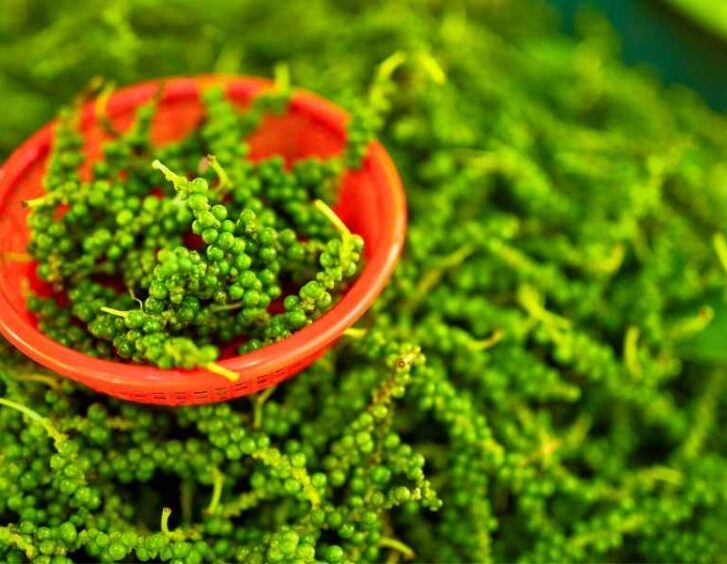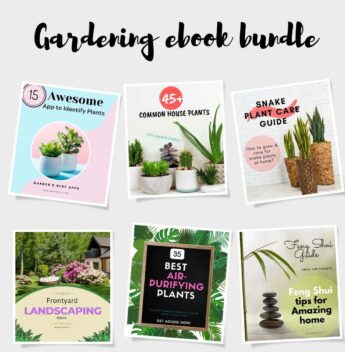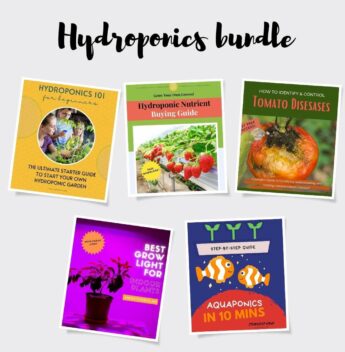To cultivate a black peppercorn plant successfully, make sure it receives ample sunlight and consistent moisture in warm, tropical climates, with an ideal temperature range of 75-85°F. This vine-like plant with glossy, dark green heart-shaped leaves yields small round fruits with a sharp heat and potent warmth attributed to piperine. Known for its pungent, slightly floral aroma, the plant's essential oils contribute to its transformative culinary power. If you want to explore further details on harvesting techniques, processing steps, culinary uses, and health benefits, you'll uncover a wealth of information on the black peppercorn plant.
Key Takeaways
- Vine-like growth pattern with glossy, dark green heart-shaped leaves.
- Clusters of small round fruits with sharp heat from piperine compound.
- Thrives in warm, tropical climates with abundant sunlight and moisture.
- Aromatic properties include warm, pungent, slightly floral aroma with earthy undertones.
- Versatile spice for both savory and sweet dishes, offering transformative power in cooking.
Origin and History
Originating from India and dating back thousands of years, the black peppercorn plant has a rich and fascinating history. As a member of the Piperaceae family, this plant has been prized for its culinary and medicinal uses since ancient times. Traders from around the world sought this precious spice, leading to the spice trade routes that connected distant lands.
You may be intrigued to know that black pepper was once considered so valuable that it was used as a form of currency. Its popularity spread to Europe, where it became a symbol of wealth and prestige. The distinctive flavor and aroma of black pepper have made it a staple in kitchens worldwide, adding a touch of warmth and spice to dishes.
Throughout history, the black peppercorn plant has been associated with prosperity, abundance, and good fortune. Its cultivation requires specific conditions, including warm temperatures, well-drained soil, and adequate sunlight. By understanding the origins and history of this plant, you can appreciate its significance and cultural importance.
Today, black pepper remains one of the most widely used spices globally, adding depth and complexity to a variety of cuisines. Whether used in savory dishes, marinades, or even desserts, the black peppercorn plant continues to be a beloved ingredient that brings people together through shared culinary experiences.
Botanical Description
The black peppercorn plant, known scientifically as Piper nigrum, is characterized by its distinctive vine-like growth pattern and clusters of small round fruits. This plant belongs to the Piperaceae family and is native to the tropical regions of India. When grown in ideal conditions, the black peppercorn plant can reach impressive heights, climbing trees or trellises with its twining stems.
The leaves of the black peppercorn plant are glossy and dark green, adding to its ornamental value. These leaves are heart-shaped and alternate along the stem, providing a lush backdrop for the plant's fruiting clusters. The plant produces small white flowers that eventually develop into the iconic peppercorns used in culinary applications worldwide.
To thrive, the black peppercorn plant requires a warm and humid environment, mimicking its native habitat. It flourishes in well-draining soil rich in organic matter and benefits from regular pruning to control its growth and encourage fruit production. Providing adequate support for its climbing habit is essential for the plant's development.
Flavor Profile
As you enjoy the culinary delights enriched by black peppercorns, you'll appreciate their intricate and adaptable flavor profile. Black peppercorns bring a sharp heat and potent warmth to dishes, making them a staple in kitchens worldwide. The primary compound responsible for their spicy kick is piperine, which gives black pepper its characteristic bold flavor. This spice not only adds heat but also a deep earthiness that complements a wide range of savory and sweet dishes.
When you crush or grind black peppercorns, you reveal their full flavor potential. Freshly ground pepper has a robust taste that can elevate dishes with its intense spiciness and aromatic qualities. The flavor of black peppercorns can vary depending on their origin, with peppercorns from different regions offering unique undertones and strengths. Some varieties may have hints of citrus, floral notes, or even a mild sweetness, adding layers of complexity to your culinary creations.
Whether you're seasoning a hearty stew, marinating meats, or sprinkling some on a fresh salad, black peppercorns are a versatile spice that can enhance a wide array of dishes. Experimenting with the amount of pepper you use can help you tailor the flavor profile to suit your preferences, from a subtle background heat to a bold peppery punch. Embrace the bold and versatile flavor of black peppercorns in your cooking and experience the depth they can bring to your favorite recipes.
Aromatic Properties
When you crush or grind black peppercorns, their aromatic properties are released, filling your kitchen with a tantalizing fragrance that enhances your culinary creations. The distinctive smell of black peppercorns is warm, pungent, and slightly floral, adding depth and complexity to dishes. This aromatic quality is due to the presence of a compound called piperine, which gives black pepper its characteristic spicy kick and robust aroma.
As the peppercorns are crushed, the essential oils containing piperine are released into the air, creating a sensory experience that awakens your taste buds and elevates the flavors of your food. Whether you're seasoning a steak, sprinkling pepper on a salad, or incorporating it into a marinade, the aromatic properties of black peppercorns play an important role in enhancing the overall taste profile of your dishes.
In addition to its aromatic qualities, black pepper is also known for its earthy undertones and hints of citrus, making it a versatile spice that pairs well with a wide range of ingredients. Its fragrance not only adds depth to savory dishes but can also be used in sweet recipes to create a unique flavor profile. Embrace the aromatic allure of black peppercorns in your cooking and discover the transformative power of this beloved spice.
Growing Conditions
To foster a flourishing black peppercorn plant, make sure it receives abundant sunlight and consistent moisture in well-draining soil. Black peppercorn plants thrive in warm, tropical climates with temperatures ranging from 75 to 85 degrees Fahrenheit. When selecting a spot for your plant, look for a location that receives plenty of sunlight, ideally around 6 to 8 hours a day. If you're growing your black peppercorn plant indoors, placing it near a sunny window can provide the necessary light it needs to thrive.
Regarding moisture, black peppercorn plants enjoy a humid environment with regular watering. Keep the soil consistently moist but not waterlogged. Overwatering can lead to root rot, so it's important to find the right balance. Additionally, make sure that the soil drains well to prevent water from pooling around the roots, which can cause them to rot.
It's crucial to monitor the moisture levels in the soil regularly and adjust your watering schedule accordingly. During the growing season, typically spring and summer, your black peppercorn plant may require more frequent watering. In contrast, during the dormant season, which is usually fall and winter, you can reduce the watering frequency to prevent overwatering. By providing adequate sunlight and moisture in well-draining soil, you can create the ideal growing conditions for your black peppercorn plant to flourish.
Cultivation Methods
Implementing proper cultivation methods is crucial for successfully growing and maintaining a black peppercorn plant. To begin, choose a suitable location for your plant. Black peppercorn plants thrive in warm, humid environments with well-draining soil and partial shade. Make sure the soil is rich in organic matter and slightly acidic for ideal growth.
When planting your black peppercorn, provide a sturdy support system for the vine to climb. This will replicate its natural habitat and promote healthy growth. Regularly water the plant, keeping the soil consistently moist but not waterlogged. Avoid overwatering, as this can lead to root rot.
Fertilize your black peppercorn plant every 6-8 weeks during the growing season to provide essential nutrients for strong growth. Use a balanced fertilizer to support overall plant health. Prune the plant periodically to control its growth and encourage bushier foliage.
Regularly check for pests and diseases, as prevention is crucial to maintaining a thriving black peppercorn plant. Address any issues promptly to prevent them from spreading. Additionally, monitor the plant for signs of nutrient deficiencies and adjust fertilization as needed.
Harvesting Techniques
For successful harvesting of black peppercorns, timing is essential to ensure ideal flavor and aroma in the final product. When the peppercorns have matured on the vine and turned from green to red, it's time to harvest. The timing of the harvest can greatly impact the pepper's taste and quality, so it's important to monitor the ripening process closely.
To harvest black peppercorns, use pruning shears to carefully cut the entire pepper spike from the vine. Make sure to wear gloves to protect your hands from the spikes on the vine. After harvesting, spread the peppercorns out in a single layer to dry. This drying process is crucial for developing the peppercorns' flavor and preserving them for storage.
Once the peppercorns are fully dried, store them in an airtight container away from light and moisture to maintain their freshness. Properly harvested and stored black peppercorns can last for a long time while retaining their intense flavor.
Processing Steps
When it comes to processing black peppercorns after harvesting, the next step involves carefully removing the outer layer to reveal the prized peppercorn seed inside. This outer layer, known as the pericarp, is what gives the peppercorn its characteristic black color. To remove this layer, the peppercorns are typically soaked in water for a few days to soften the outer coating. After soaking, the outer layer is rubbed off, revealing the smooth seed inside.
Once the seeds are exposed, they're spread out to dry in the sun. This essential drying process is vital for preserving the flavor and aroma of the peppercorns. The seeds need to be turned regularly to guarantee even drying. It's important to safeguard the drying peppercorns from rain or excess moisture, as this can impact the quality of the final product.
After the peppercorns are fully dried, they're ready to be sorted based on size and quality. This sorting process ensures that only the finest peppercorns make it to market. The peppercorns are then packaged and shipped to be used in kitchens around the world.
Culinary Uses
To enhance the flavor of your dishes, incorporating freshly ground black peppercorns can elevate your culinary creations to new heights. Black peppercorns are a versatile spice that can be used in a variety of dishes to add a depth of flavor and a subtle heat. Whether you're seasoning a steak, sprinkling it over a salad, or adding it to a soup, black peppercorns can truly enhance the taste of your meals.
One of the key culinary uses of black peppercorns is as a seasoning for meats. When used to coat a steak or a piece of chicken before cooking, black peppercorns can create a delicious crust that adds both flavor and texture. Additionally, freshly ground black peppercorns can be sprinkled over roasted vegetables to give them a savory kick.
Black peppercorns are also commonly used in salad dressings and marinades. By adding freshly ground black peppercorns to a vinaigrette or a marinade, you can infuse your dish with a warm, spicy flavor that complements the other ingredients.
Health Benefits
Exploring the health benefits of black peppercorns reveals their potential to enhance your overall well-being and dietary experience. Black peppercorns are more than just a spice; they offer a range of health advantages that can contribute to your wellness journey.
Firstly, black peppercorns contain a compound called piperine, which has been linked to improved digestion. By stimulating the secretion of digestive enzymes, piperine aids in the breakdown of food and enhances nutrient absorption, ensuring that your body utilizes the goodness from the foods you consume efficiently.
Additionally, the antioxidants present in black peppercorns can help protect your cells from damage caused by free radicals. These antioxidants have anti-inflammatory properties that may reduce the risk of chronic diseases and support your immune system, keeping you feeling strong and healthy.
Moreover, black peppercorns have been associated with potential weight management benefits. Piperine may interfere with the formation of fat cells, potentially assisting in weight loss efforts when combined with a balanced diet and regular exercise routine.
Incorporating black peppercorns into your meals not only adds flavor but also brings along these health perks, making it a valuable addition to your culinary endeavors. So, next time you reach for the pepper grinder, remember the additional boost of well-being you're adding to your plate.
Frequently Asked Questions
Does the Black Peppercorn Plant Have Any Natural Predators or Pests That Affect Its Growth?
Sure thing! Yes, the black peppercorn plant does have natural predators and pests that can affect its growth. These can include insects like aphids and mites, as well as diseases like root rot.
What Is the Average Lifespan of a Black Peppercorn Plant?
On average, a black peppercorn plant can live up to 20 years. It necessitates proper care and maintenance to reach its full lifespan potential. Guarantee adequate sunlight, water, and soil quality to help your plant thrive.
Are There Any Specific Superstitions or Cultural Beliefs Associated With the Black Peppercorn Plant?
In various cultures, the black peppercorn plant holds significance beyond its culinary use. Superstitions and beliefs are intertwined with its presence, symbolizing protection, prosperity, and warding off evil spirits. Embrace these rich traditions.
How Does the Black Peppercorn Plant Contribute to the Local Ecosystem in Its Native Regions?
In its native regions, the black peppercorn plant plays an essential role in the local ecosystem by providing habitat and food for various insects and birds. It helps maintain biodiversity and supports the balance of nature.
Are There Any Traditional Rituals or Ceremonies Involving the Cultivation or Harvest of Black Peppercorns?
In some cultures, traditional ceremonies mark the cultivation and harvest of black peppercorns. These rituals symbolize gratitude, abundance, and community connection. Participating in these practices fosters a sense of belonging and reverence for nature's gifts.
Conclusion
To sum up, the black peppercorn plant is a versatile and popular ingredient known for its bold flavor and aromatic properties.
With the right growing conditions, harvesting techniques, and processing steps, you can enjoy the culinary uses and health benefits of this plant.
Whether you're adding a dash of pepper to your favorite dish or using it for its medicinal properties, the black peppercorn plant is a valuable addition to any garden or kitchen.
















